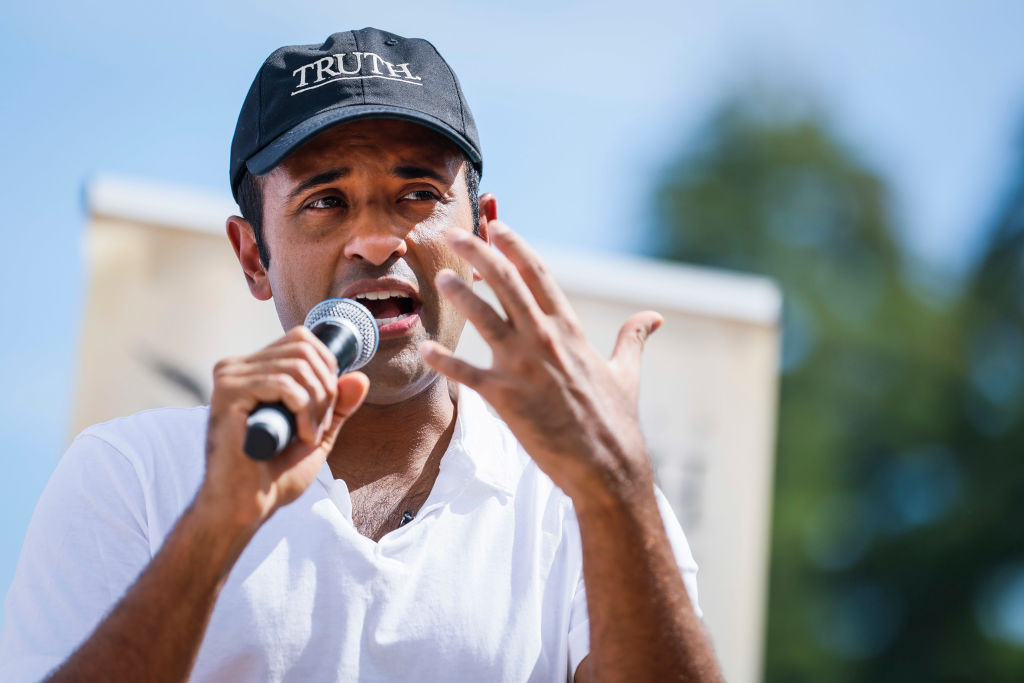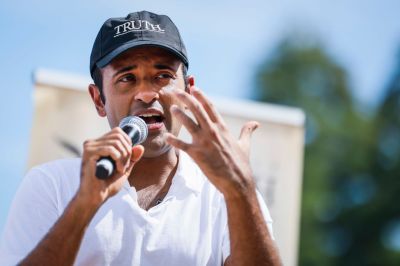Republican presidential candidate Vivek Ramaswamy’s remarks last month about the September 11, 2001, terror attacks that took the lives of 2,977 innocents afford us an opportunity to end a harmful trend: allowing public figures who indulge in conspiracy theories and make outrageous statements to be deemed fit for high office.
Ramaswamy asks, “How many police, how many federal agents were on the planes that hit the Twin Towers?” and “Do I believe the 9/11 commission?”—answering the latter question, “Absolutely not” because “there are lies the government has told about 9/11” regarding Saudi Arabia’s involvement in the attacks.
No serving law enforcement officers were on American Airlines Flight 11 and United Airlines Flight 175. However, 37 Port Authority police officers, 23 New York City police officers, three New York State court officers, an FBI agent, and a Secret Service agent gave their lives rescuing about 47,000 civilians from the World Trade Center.
Since then, more than 300 members of the NYPD have died of Ground Zero-related illnesses, including a friend, Inspector Michael O’Neil of the Counterterrorism Division, and more than a dozen Port Authority police, too. And more than 650 New York City firefighters were killed on 9/11 or felled by related illnesses since, among them a boyhood friend who always dreamed of joining the FDNY. Their names grace renamed streets all over outer borough and suburban New York in a sad roll call. Their sacrifice deserves a better legacy than glib biotechnology entrepreneurs speculating about a conspiracy.
And what, exactly, is Ramaswamy’s “just asking questions” statement supposed to imply? What would the absence or presence of law enforcement on Flights 11 and 175 indicate? Would their absence—which incorrectly assumes agents or officers are ordinarily on every flight in this country—suggest that U.S. law enforcement personnel were warned to stay off of those flights? Yet no cop said a word about this to anyone for the past 22 years? Alternatively, would agents or officers’ presence on the flights mean they went on suicide missions, directing hijackers against fellow Americans?
Ramaswamy’s assertion that the government lied about Saudi involvement in the attacks demonstrates that he’s confusing the 2004 report of the 9/11 commission—the conclusions of which have yet to be seriously challenged—with the 2002 report of the congressional joint intelligence committee (JIC) on the same subject. In 2016, after years of back-and-forth between Congress and both the Bush and Obama administrations, the U.S. government declassified a sensitive 28-page annex to the JIC report about known contacts between the hijackers and junior Saudi officials. The report found these links, while admittedly suspicious, to be inconclusive regarding any witting efforts by senior Saudi government officials.
In 2002-03, I was privileged to be mobilized from the reserves for counterterror duty with the Joint Staff Directorate of Intelligence. With fires at Ground Zero barely extinguished, I joined thousands of other American military, law enforcement, intelligence, and diplomatic personnel in trying to piece together what led to the worst day in American history. A young lawyer in civilian life, my uniformed tour took me to Guantanamo Bay and then Afghanistan, developing and chasing leads from the U.S. military’s al-Qaeda detainees. Separately the CIA gradually captured al-Qaeda leaders and subjected them to controversial—but indubitably effective—enhanced interrogations between about 2002 and 2004. With the additional benefit of all kinds of intelligence, the picture of the 9/11 plot became, and still is, pretty clear: Al-Qaeda, an essentially stateless terror group, had varying levels of contact with and support from officials of different governments before and after 2001.
The 9/11 commission, with the benefit of the 2003 interrogation of Saddam Hussein, concluded that despite leads pursued by the Bush administration in 2001-02, Iraq was uninvolved in the attack. The commission remained studiously agnostic about Iran’s possible role in the attack. Iran indeed assisted al-Qaeda, sharing its design for the bomb that destroyed the U.S Marine barracks in Beirut in 1983 for al-Qaeda’s attacks on U.S. embassies in East Africa in 1998, and sheltering and giving safe transit to al-Qaeda leaders after 9/11. (Intriguingly, hijacker Mohammed Atta and Iranian-backed Hezbollah arch-terrorist Imad Mughniyeh shared a commercial airline flight before 9/11.Whether or not they were seatmates will remain unknown, as Mughniyeh was killed in 2008, in retaliation for his wiping out the U.S. Embassy in Beirut in 1983.)
The one important new fact learned since the JIC and 9/11 reports of 2002-04 has nothing to do with lies about the Saudi government, but with the realization that American Anwar al-Awlaki, who had substantial contact with the hijackers, was a proto-terrorist and not, as then widely believed, a peaceful cleric. Awlaki even admitted as much, before being killed in a drone strike in 2011.
Some believed that the FBI tried unsuccessfully to run Awlaki as a source after 9/11. Out of oversensitivity to that failure (good for the bureau for trying, I say), and for fear of risking the integrity of the convictions of other terrorists who had contact with Awlaki, the FBI seemed reluctant to reinvestigate his 2000-01 contacts with men who are still at liberty to discuss it. The bureau assured King in 2012 that it remained active in its 9/11 reinvestigation, Operation ENCORE—although hinted-at arrests never followed.
To their credit, building on capabilities and intelligence developed by George W. Bush, Barack Obama killed Osama bin Laden, and Joe Biden killed his successor Ayman al-Zawahiri. May the handful of al-Qaeda senior leaders from 2001 remaining at large share similar fates.
But other than Awlaki’s role, after diligent investigation by many members of the executive and legislative branches and an independent commission, the story of 9/11 remains substantially what was known two decades ago. And the terror group conducted its attack despite the best efforts of the Bill Clinton and Bush administrations to thwart it.
The idea that 9/11 was an “inside job” has slithered from the extreme left to the extreme right of American politics. The hijacker pilots arrived in this country for flight training in 2000. Is it Ramaswamy’s assertion that some combination of the Clinton administration, the Bush administration, and the national security community allowed al-Qaeda to commit mass murder in the U.S.? To what end? Were Bush’s remarks—with a bullhorn on top of a firetruck in New York City, at the National Cathedral in Washington, and in private to the bereaved—world-class acting? Why has no conspirator’s guilty conscience since led them to confess their role in such a monstrous plot?
None of this makes any sense, any more than some radical Islamists’ efforts to blame 9/11 on their traditional bêtes noires, Israel and the Jews. But as Richard Hofstadter wrote, there is unfortunately a paranoid style in American political life. This stretches back to Protestant colonists fearing plots by French-Canadian Jesuits, while other early Americans were suspicious of the influence of Freemasons, or dreaded slave rebellions. Over the past 30 years or so, conspiracy theories have become ever more bizarre.
A few examples: The Clintons had their kill list, Bush lied about Iraqi weapons of mass destruction, Obama was born in Kenya, and the KGB—somehow forseeing that he could be a future president—forged his U.S. birth certificate. Donald Trump approved and recommended coronavirus vaccinations containing mind-control chips designed by Bill Gates. Biden stole the presidency in 2020, but forgot to give Democrats solid congressional majorities. This election cycle, Robert F. Kennedy, Jr. claims that the CIA murdered his uncle John Kennedy. And of course devotees of “Q” know that leading Democrats are both child enslavers and molesters, and are also either human cannibals, aliens, or lizards.
Ramaswamy’s remarks are as cockamamie as any of these theories. There was a time when a candidate caught saying them would be laughed out of the race. George Romney’s “brainwashing” over Vietnam, Curtis LeMay’s ruminations on using nuclear weapons, Edward Muskie’s possible tears over an insult to his wife, and even an odd-sounding celebratory noise by Howard Dean: Each ended the national candidacies of substantial men who served in high offices. Gerald Ford’s clumsy answer to a debate question about Soviet domination of Poland, and running mate Bob Dole’s snide remark about “Democrat wars,” helped cost them the 1976 election despite both men’s fine qualities.
Now in contrast, Ramaswamy rises in the polls. The United States needs a serious and conservative center-right party to serve as a counterweight to an increasingly left-wing Democratic party. Republicans’ credibility regarding national security issues suffered greatly over the past eight years. A good way for the GOP to begin exiting the fever swamps would be to give Ramaswamy the hook—specifically because of his statements about 9/11.






Please note that we at The Dispatch hold ourselves, our work, and our commenters to a higher standard than other places on the internet. We welcome comments that foster genuine debate or discussion—including comments critical of us or our work—but responses that include ad hominem attacks on fellow Dispatch members or are intended to stoke fear and anger may be moderated.
With your membership, you only have the ability to comment on The Morning Dispatch articles. Consider upgrading to join the conversation everywhere.